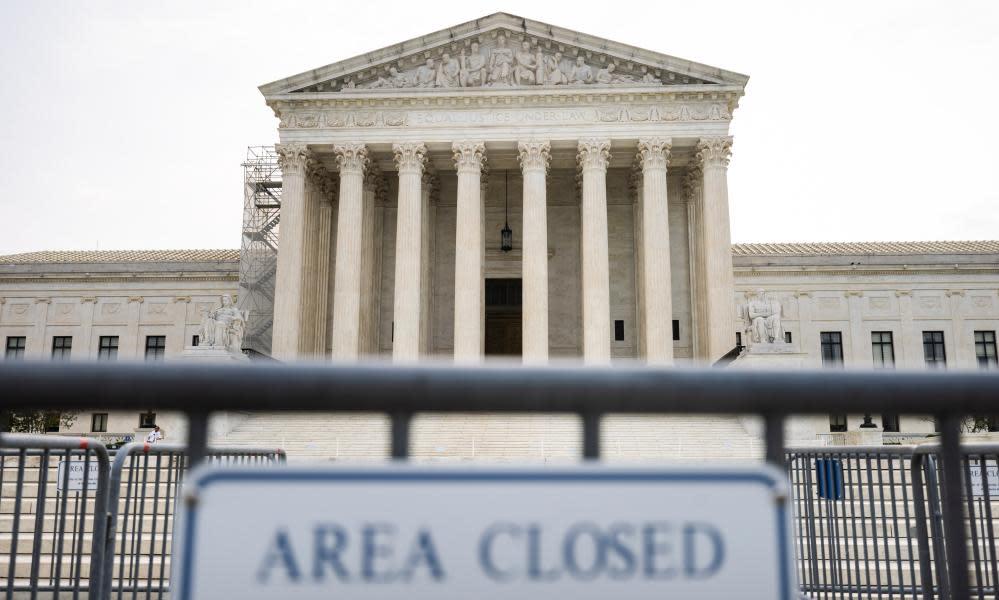Supreme court leaves intact Mississippi law disenfranchising Black voters

The US supreme court turned away a case on Friday challenging Mississippi’s rules around voting rights for people with felony convictions, leaving intact a policy implemented more than a century ago with the explicit goal of preventing Black people from voting.
Those convicted of any one of 23 specific felonies in Mississippi permanently lose the right to vote. The list is rooted in the state’s 1890 constitutional convention, where delegates chose disenfranchising crimes that they believed Black people were more likely to commit. “We came here to exclude the negro. Nothing short of this will answer,” the president of the convention said at the time. The crimes, which include bribery, theft, carjacking, bigamy and timber larceny, have remained largely the same since then; Mississippi voters amended it remove burglary in 1950 and added murder and rape in 1968.
Related: US progressives call for urgent actions after court blocks student debt relief
It continued to have a staggering effect in Mississippi. Sixteen per cent of the Black voting-age population remains blocked from casting a ballot, as well as 10% of the overall voting age population, according to an estimate by The Sentencing Project, a criminal justice non-profit. The state is about 38% Black, but Black people make up more than half of Mississippi’s disenfranchised population.
Challengers to the law argued that the policy was unconstitutional because it bore the “discriminatory taint” from the 1890 constitution. One of the plaintiffs was Roy Harness, a social worker in his late 60s who is permanently barred from voting because he was convicted of forgery decades ago. Forgery was one of the original crimes included in the list of disenfranchising offenses.
“It makes me feel bad. I’ve served my country, nation … got a degree and [I] still can’t vote, no matter what you do to prove yourself,” Harness told the Guardian in 2022.
Once a person loses their right to vote in Mississippi it is essentially impossible to get it back. To do so, a disenfranchised person must get the legislature to approve an individualized bill on their behalf by a supermajority in both chambers and then have the governor approve the bill. There are no online instructions or applications, and lawmakers can reject or deny an application for any reason.
Hardly anyone successfully makes it through the process. Between 1997 and 2022, an average of seven people successfully made it through the process each year, according to Blake Feldman, a criminal justice researcher in Mississippi.
Both a federal district judge and the US court of appeals for the fifth circuit upheld Mississippi’s policy. The modifications to the policy in 1950 and 1968, the fifth circuit noted, got rid of any discrimination in the original policy.
The supreme court did not say on Friday why it was rejecting the case (it takes four votes on the court to grant review) and Justices Ketanji Brown Jackson and Sonia Sotomayor were the only two justices who noted their dissent from the denial. Jackson wrote an opinion saying the fifth circuit had committed “two egregious analytical errors that ought to be corrected”.
First, she wrote, even though Mississippi voters removed a crime in 1950 and added two more in 1968, the substance of many of the original crimes from 1890 remained intact. That means that the list is still discriminatory, she wrote in a dissent that was joined by Sotomayor.
“The “remaining crimes” from [the list of crimes] pernicious origin still work the very harm the 1890 Convention intended – denying Black Mississippians the vote,” she wrote.
She also took issue with a conclusion from the fifth circuit that the list of crimes would have been enacted absent discriminatory intent. A taskforce and Mississippi lawmakers studied whether to amend the list of crimes in the 1980s, nearly a century after the convention and chose not to. “Subsequent legislative attention to Mississippi’s election laws indicates that Section 241 was carefully evaluated before the legislature opted to leave it unchanged.
“The Task Force recommendations and legislative process bespeak the nondiscriminatory motivations of the public and the legislature,” the fifth circuit wrote.
Jackson said the proper inquiry for the court would have been to look at whether the convention originally would have enacted the list absent discriminatory intent.
She ended her opinion quoting the majority’s opinion in Thursday’s decision ending race-conscious admissions at universities.
“The other day, this Court declared that the ‘Constitution deals with substance, not shadows,’ and the [constitutional] prohibition against racial discrimination is ‘levelled at the thing, not the name’,” she wrote. “There are no shadows in §241, only the most toxic of substances.
“Constitutional wrongs do not right themselves. With its failure to take action, the Court has missed yet another opportunity to learn from its mistakes.”

